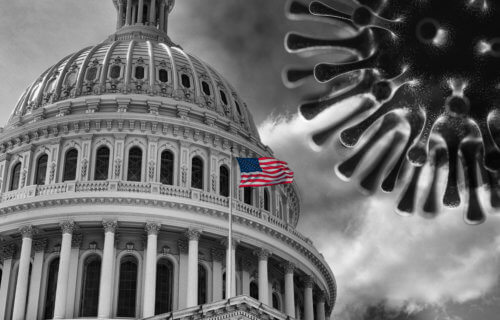BALTIMORE — As millions of Americans deal with coronavirus infections, millions more struggle through the pandemic’s economic impact. A survey taken during the height of the health crisis finds COVID-19 may have pushed more people to want government to play a bigger role in their lives. Researchers in Maryland say the number of people wanting sweeping changes in government policy skyrocketed as the virus spread.
A team from Johns Hopkins Bloomberg School of Public Health and the Johns Hopkins University SNF Agora Institute say support for an active government role in society jumped over 40 percent between September 2019 and April 2020. The World Health Organization declared COVID-19 a global pandemic in March.
While some policies are still not very popular, a majority of respondents have gotten behind creating more government safety nets for healthcare, unemployment, and income. Nearly 1,500 adults were polled in mid-April regarding 11 government policies including paid sick leave, universal health insurance, income support, business tax credits, and employment education.
The poll, conducted using NORC’s Amerispeak Panel, reveals overwhelming support for reform from those wanting a more active government. Among respondents saying the government should play a stronger part in American life, 88 percent want two-weeks paid sick leave. Four in five supported an increased minimum wage and 73 percent favored universal health insurance.
Will short-term fixes become permanent policies?
Researchers note that some of these safety nets went into effect this spring amid growing COVID cases and statewide lockdowns. Initially, the Families First Coronavirus Response Act launched days after the pandemic declaration to assist the 22 million Americans filing for unemployment.
The Coronavirus Aid, Relief, and Economics Security (CARES) Act is also offering tax credits to support worker retention until January 2021. Unfortunately, parts or all of these measures have expired, leaving families in limbo as the federal government continues to disagree on the next step in relief aide.
“Critical safety net policies passed in the initial phase of the pandemic are expiring or have expired, and finding common ground on extending them has proved difficult,” says lead author Colleen L. Barry in a university release. “An awareness on the part of policymakers of heightened support for the government aiding individuals and families who have experienced pandemic-related dislocations could make a difference.”
America’s COVID-related policy choices
Overall, seven of the 11 policies in the survey received strong support from Americans in April. More than three-quarters (77%) of adults supported two weeks of employer-guaranteed sick leave during the spring. Six in 10 respondents got behind the idea of universal health insurance. Nearly the same amount also embraced increasing the federal minimum wage.
Other policies including extending unemployment benefits (52%), tax credits for businesses (66%), employment education and training programs (68%), and public spending on construction projects (71%) all gained more support than they had in 2019.
Some policies however, are still not going over well despite the pandemic’s impact. Single payer health insurance (47%), government-funded sick leave (39%), government-funded family leave (48%), and a universal basic income (39%) are still unpopular with a majority of the country.
“As Congress debates continued relief for Americans suffering health and economic consequences from the pandemic, our data shows there is growing support for passing the kind of policies that they have been unable to pass in the last few months,” concludes co-author Hahrie Han of the SNF Agora Institute at Johns Hopkins University.
The findings appear online in the American Journal of Public Health.
